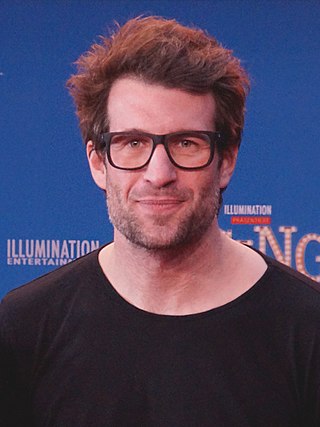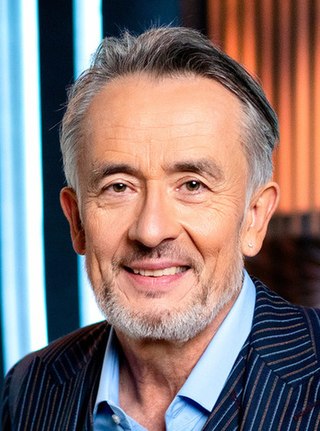
The Eurovision Song Contest 1957 was the second edition of the annual Eurovision Song Contest. Organised by the European Broadcasting Union (EBU) and host broadcaster Hessischer Rundfunk (HR) on behalf of ARD, the contest, originally known as the Grand Prix Eurovision de la Chanson Européenne 1957 was held on Sunday 3 March 1957 and was hosted at the Großer Sendesaal des hessischen Rundfunks in Frankfurt, West Germany by German actress Anaid Iplicjian.
Germany was represented at the Eurovision Song Contest 1957 with the song "Telefon, Telefon", composed by Friedrich Meyer, with lyrics by Ralph Maria Siegel, and performed by Margot Hielscher. The German participating broadcaster on behalf of ARD, Hessischer Rundfunk (HR), selected its entry through a national final. In addition, HR was also the host broadcaster and staged the event at the Großer Sendesaal des hessischen Rundfunks in Frankfurt.

Goethe University Frankfurt is a public research university located in Frankfurt am Main, Germany. It was founded in 1914 as a citizens' university, which means it was founded and funded by the wealthy and active liberal citizenry of Frankfurt. The original name in German was Universität Frankfurt am Main. In 1932, the university's name was extended in honour of one of the most famous native sons of Frankfurt, the poet, philosopher and writer/dramatist Johann Wolfgang von Goethe. The university currently has around 48,000 students, distributed across four major campuses within the city.
The Goethe Prize of the City of Frankfurt is an award for achievement "worthy of honour in memory of Johann Wolfgang von Goethe" made by the city of Frankfurt am Main, Germany. It was usually an annual award until 1955, and thereafter has been triennial. Following a decision of municipal authorities in 1952, the "Award of the Goethe Prize" only takes place every three years. Many recipients are authors, but persons working in several other creative and scientific fields have been honoured. The prize money is €50,000.

Hessischer Rundfunk, shortened to HR, is the German state of Hesse's public broadcasting corporation. Headquartered in Frankfurt, it is a member of the national consortium of German public broadcasting corporations, ARD.

The Frankfurt Radio Symphony is the radio orchestra of Hessischer Rundfunk, the public broadcasting network of the German state of Hesse. Venues are Alte Oper and hr-Sendesaal. Music director is the French conductor Alain Altinoglu. Chief conductors have brought in Russian, Nordic and French influences. The orchestra has been one of the leading Mahler and Bruckner orchestras internationally. The hr-Sinfonieorchester with 108 musicians is the third oldest in the ARD.

Emil Mangelsdorff was a German jazz musician who played alto saxophone, soprano saxophone, clarinet and flute. He was a jazz pioneer under the Nazi regime which led to his imprisonment. After World War II and years as a prisoner of war, he was a founding member of the jazz ensemble of Hessischer Rundfunk in 1958. He played with several groups and was active, also as an educator, until old age.

Peter Härtling was a German writer, poet, publisher and journalist. He received the Order of Merit of the Federal Republic of Germany for his major contribution to German literature.
Germany was represented at the Eurovision Song Contest 1975 with the song "Ein Lied kann eine Brücke sein", composed by Rainer Pietsch, with lyrics by Michael Holm, and performed by Joy Fleming. The German participating broadcaster on behalf of ARD, Hessischer Rundfunk (HR), selected their entry through a national final.
Esther Schapira is a German journalist and filmmaker, currently politics and society editor at the German public television network, the Hessischer Rundfunk.
The Deutsche Journalistenschule e.V., the German School of Journalism, is a journalism school in Germany. At the time of its establishment, it was the country's first German journalism school. Today, Deutsche Journalistenschule is considered one of the best schools for journalism in Germany, along with the Henri-Nannen-Schule in Hamburg.

Hadayatullah Hübsch was a German author, journalist, poet, political activist of the 68s movement and, following his conversion to Ahmadiyya Islam, long-time spokesman of the Ahmadi Community in Germany. He also served as an Imam of the Noor Mosque in Frankfurt. From 1991 to 1998 he was chairman of the Association of German Writers (VdS) in Hesse and in his last years he worked as a writer in Frankfurt.

hr-Sendesaal, formerly Großer Sendesaal des Hessischen Rundfunks is a music hall and former television studio based in Frankfurt am Main, Germany. The hall is part of the Broadcasting House Dornbusch, the former headquarters of the German public broadcaster Hessischer Rundfunk (HR).

Andreas Bomba is a German journalist, writer, historian, critic, and singer, the festival director of the Bachwoche Ansbach since 2006.
Martin Lüdke is a German literary critic.

Daniel Hartwich is a German TV presenter.
Alois Ickstadt is a German pianist, choral conductor, university professor and composer. He was professor at the Musikhochschule Frankfurt. He promoted choral singing from children's choir to adult groups for the state broadcaster Hessischer Rundfunk, namely the Figuralchor Frankfurt which he founded in 1966 and conducted until 2011.

Tabea Rößner is a German journalist and politician of Alliance 90/The Greens who has been serving as a member of the Bundestag since 2009. In 2019, she unsuccessfully ran as the Green Party's candidate for Mayor of Mainz.

Bernd Loebe is a German music journalist and opera manager. After working as a journalist with a focus on opera and voice for the Frankfurter Allgemeine Zeitung (FAZ), Neue Musikzeitung, Opernwelt and Hessischer Rundfunk, he was artistic director of the opera house of Brussels, La Monnaie, from 1990, and has been Intendant of the Oper Frankfurt since 2002, where he encouraged a capable ensemble, international guest artists, and the production of rarely performed operas. He received the 2018 International Opera Award in the category Leadership in Opera.

Gert Scobel is a German journalist, television moderator, author and philosopher.













